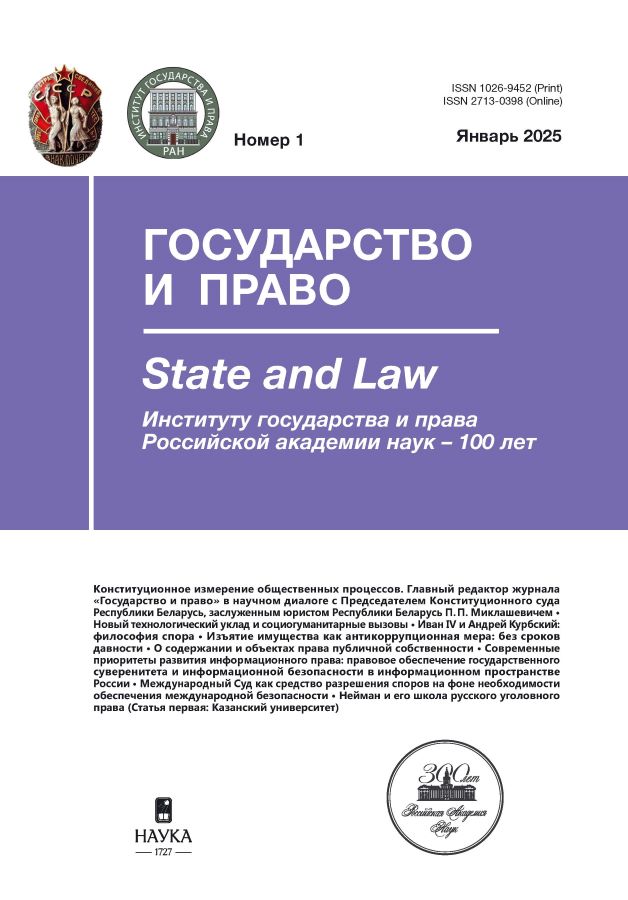The principle of dispositivity in Civil Law in the context of personal respect in the digital environment
- Autores: Volos A.A.1
-
Afiliações:
- HSE University
- Edição: Nº 1 (2025)
- Páginas: 126-134
- Seção: Civil and entrepreneurial law
- URL: https://kld-journal.fedlab.ru/1026-9452/article/view/678457
- DOI: https://doi.org/10.31857/S1026945225010115
- ID: 678457
Citar
Texto integral
Resumo
The purpose of the study is to identify the features of the principle of dispositively. According to the author it is the tool for regulating relations when subjects use digital technologies. Among the most problematic aspects of the topic, the following aspects are identified: the existence of a subjective right connected with refusing of digital technologies, elements of the principle of dispositivity, its correlation with the need to ensure the security of society and the state. Among the most fundamental conclusions put forward is the postulate that the right to refuse to use digital technologies should be guaranteed only in relation to the procedural aspects of the implementation of fundamental human and civil rights enshrined in the Constitution of the Russian Federation.
Texto integral
Sobre autores
Alexey Volos
HSE University
Autor responsável pela correspondência
Email: volosalexey@yandex.ru
ORCID ID: 0000-0001-5951-1479
PhD in Law, Associate Professor, Associate Professor of the Department of Private Law, Faculty of Law
Rússia, 20 Myasnitskaya str., 101000 MoscowBibliografia
- Volos A. A., Ivanov A. A. Digitalization and the constitution // Law. 2022. No. 12. Pp. 34–45 (in Russ.).
- Denisov D. S. Digital ecosystems and the right to abandon technologies // International Journal of Open Information Technologies. 2023. Vol. 11. No. 12. P. 128 (in Russ.).
- Kravchenko A. G., Ovchinnikov A. I. Principles and priorities of Russia’s legal policy in the field of digital economy // NB: Administrative Law and Practice of Administration. 2020. No. 4. Pp. 1–10 (in Russ.).
- Pokrovsky I. A. Basic problems of Civil Law. M., 1917. Pp. 98, 106, 110 (in Russ.).
- Sukhanov E. A. On the civil nature of “digital property” // Herald of Civil Law. 2021. No. 6. Pp. 25, 26 (in Russ.).
- Talapina E. V. Algorithms and artificial intelligence through the prism of human rights // Journal of Russ. law. 2020. No. 10. Pp. 25–39 (in Russ.).
- Fedotov M. A., Naumov V. B., Deineko A. G., Tytyuk E. V. The right to abandon digital technologies: results of an expert survey // Works on intellectual property. 2024. Vol. 48. No. 1. Pp. 8–28 (in Russ.).
- Yakovlev V. F. Selected works. Vol. 2: Civil Law: History and modernity. M., 2012. Book 1. P. 92 (in Russ.).
- Basedow J. Der Grundsats der Nichtdiskriminierung im europäisschen Privatrecht // Fundamentale Grundsätze des Privatrechts in vereinigten Europa. Bratislava, 2007. S. 37.
- Grgic I. T. The Impact of the Contract of Inheritance on the Principle of Freedom of Testation. SGEM Conference on political Sciences, Law, Finance, Economics & Turism. Albena, Bulgaria. Vol. I. P. 851.
- Stephan Wolf S., Hrubesch-Millauer S., Eggel M. et al. Der Erbvertrag aus rechtsvergleichender Sicht / Il contratto successorio, aspetti di diritto comparato. Stämpfli Verlag AG Bern, 2018. S. 29.
- Weilinger A. Privatrecht. Eine Einführung. Wien, 2016. S. 6–8.
Arquivos suplementares










